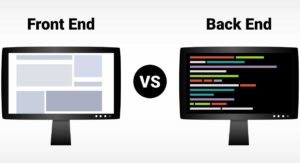Have you ever considered who’s designing the websites, software, and smartphone apps you visit or use daily? There’s a never-ending flood of web pages and applications, so someone must be creating them, right? Could that someone be you?
Coders create the online digital resources we all use. This article answers the question, “What does a coder do?” We will see what coding is, what coders do, the various coding jobs, the requirements for becoming a coder, and a way for aspiring coders to join this exciting, in-demand vocation through an online web development program.
The first step is defining coding. Let’s begin.
What is Coding Exactly?
Coding is the act of writing instructions so computers can understand them and know how to perform a particular group of tasks. The written code depends on the system’s goals and the coder’s programming language constraints.
Coding is also called programming, and coders are also called computer programmers, developers, or software engineers.
So, coders are the digital world’s construction workers of the digital world. They assemble the building blocks necessary to create websites, apps, and other types of computer software.
Also Read: The Latest Buzz on Full Stack Developer Salaries
Who is a Coder?
Coders are professionals who use programming languages to communicate with software and computers, making them perform specific tasks. Since computers use machine code to process information, coders work with programming languages that computers can translate into machine language and follow the code’s instructions. Some of the most common programming languages in the industry today include Java, Python, and C#. Coders may also work with languages like CSS, HTML, JavaScript, and PHP to write code for Internet websites and applications.
Let’s go into more depth on what a coder does.
What Does a Coder Do?
Coders are IT professionals who use various programming languages to talk with computers and software, making them perform specific tasks. Since computers and software are only as intelligent and versatile as the humans who program them, the job of a coder is to translate commands and information into a form that the IT resource understands and will act upon.
In summary, here is more about the job of a coder:
- First, they collaborate with departments, management, and customers to identify end-user specifications and requirements.
- They write programs in various computer languages (e.g., Python, C++, or Java).
- They update, upgrade, and expand existing computer programs.
- They test programs for errors and repair faulty lines of computer code.
- They simplify development by creating, modifying, and testing software codes and scripts.
- They observe user feedback that recommends improvements to existing software products.
- They develop technical documentation that will guide future development projects.
This collection of responsibilities is simple enough, but when you ask, “What do coders do?” you must understand that the job can vary depending on the organization’s size, the coder’s experience level, and even the industry.
- Based on Career Stage. Regarding experience and career stage, junior coders typically report to senior coders and get assigned non-critical jobs. Mid-level coders, professionals with at least five years of experience, usually get assigned an entire piece of software for the development project. Senior coders, typically professionals with at least ten years of experience, generally are the project leaders, with coding teams and managers under them. These professionals help build the application and take a leadership role, handling delivery, assessing customer feedback, and suggesting future updates.
- Based on Industry. Here’s a small sample of industries and what they expect from coders.
o Finance. Coders help develop new financial applications, develop algorithms to detect financial fraud and use data to study market patterns.
o Government. The government sector hires more coders for cybersecurity and data science purposes. Data science helps process and study vast amounts of public data, and cybersecurity helps maintain compliance with data safety policies.
o Healthcare. Coders in the healthcare industry help develop image processing techniques to study things like CAT scans and MRIs and work in data processing to identify patterns in how diseases evolve and spread.
o Tech. Unsurprisingly, tech-based companies rely heavily on coders. Responsibilities include maintaining the large databases, building and managing the company’s internal networks, and developing new software applications.
- Based on Company Size. Coders’ responsibilities vary based on the size of their company. Let’s look at the breakdown:
o Startups. Startups are small organizations trying to get off the ground and are often still exploring their target market and constantly tweaking their services and products. Thus, startup coders must learn things quickly, produce updates frequently, and be ready to handle abrupt course corrections. The very nature of startups means you may be called upon to wear multiple hats.
o Mid-Sized Companies. Coders are expected to thoroughly understand the company’s products and services and how they work. Coders typically operate as part of a team and may specialize and work on specific aspects of the service or product.
o Large Companies. Coders are expected to work with multiple teams and managers and often perform in various roles. So, as in startups, you may wear multiple hats. Things come full circle!
Also Read: An Ultimate Guide to Full Stack Developer Skills
The Different Types of Coding Jobs
When figuring out what does a coder do, we must recognize the different types of coding jobs available. However, coders of all kinds have one thing in common: their essential role in the software development life cycle (SDLC).
The SLDC comprises seven stages (Planning, Analysis, Design, Implementation, Testing, Deployment, and Maintenance). Typically, coders only do a little during the planning, analysis, or design stages, although they may occasionally offer input.
Coders can expect to devote most of their efforts to the implementation and maintenance phases. In the implementation phase, also called the development phase, the coders follow the design documentation and write the program. This phase will take up most of the coder’s time and energy.
The testing and deployment phases infrequently concern coders, although they may be called upon to deal with unexpected errors on launch day. Coders are also busy during maintenance since they must respond to user feedback to tweak the program, fix bugs, and create updates.
Programming Languages Used by Coders
The more skilled you are, the more valuable you become to recruiters. If you’re a coder, there’s no such thing as being too knowledgeable. Here’s a list of programming languages typically used by coders:
- Python
- Java
- JavaScript
- Ruby
- SQL
- C++
In addition, it’s helpful to gain knowledge of frameworks and systems such as AngularJS and Git.
Coders vs. Programmers
Although the terms “coder” and “programmer” are often used interchangeably, they are different jobs. So, what does a coder do that’s different from a programmer’s job description? Coding is considered a subset of programming. Although every programmer is a coder, not all coders are programmers. Programmers require a greater in-depth understanding of the different programming languages, using them to develop and execute various applications or functions. Programmers also typically solve issues that arise from code and employ more creativity and conceptualizing rather than coding.
Still, there’s no real issue using the two terms interchangeably. It most likely makes no difference in smaller organizations where people wear more than one hat anyway.
What Does a Coder Do: Necessary Skills and Requirements
Now that we have a clearer idea about what coders do, we need to quantify what requirements and skills coders need to carry out their responsibilities. Here is a list of skills and requirements for coders. Only some organizations will require every one of the following: needs vary. However, many of these items will appear in most recruiters’ wish lists.
- A bachelor’s or master’s degree in a field such as software engineering, computer science, or something related
- At least three years of experience in application development
- Proficiency in popular coding languages such as Python, Java, JavaScript, Ruby, SQL, and C++, as well as frameworks or systems like AngularJS and Git
- An excellent understanding of the software development life cycle
- Strong problem-solving and communication skills
- Experience with development methodologies such as Agile and Scrum
- The ability to learn quickly and work as part of a team or independently
- The ability to think analytically and logically, understanding problems and breaking them down into logical pieces
Can you become a coder without any prior experience? Luckily, yes, you can. We’ll elaborate on this later.
How Do You Start a Career in Coding?
Let’s look at the different paths you can take to secure the job of a coder eventually.
- Teach Yourself. For this path, you must study independently, check out bootcamps and other educational resources, build a portfolio of successful coding projects, and apply for an entry-level position. This is an entirely self-motivated option, with no compensation or help from any organization.
- Get a degree. This option is ideal for the hopeful coder who has yet to commit to their career or higher education path. This strategy is a several-year commitment where you study a major such as computer science and pick up many other skills. But, of course, colleges are a significant investment of time and money. However, on the upside, you will graduate with a valuable assortment of information and skills.
- Take a course. This option might be the most ideal and easy to do. In this case, you take a class or two at a university or via an online resource, such as a bootcamp. This path costs less than getting a degree; you get certification that shows employers your qualifications, and it doesn’t dominate your time, so you can hold down a job as you learn.
Speaking of bootcamps, we have just the thing for you if you’re going with that option for starting your coding career.
Here’s an Easy Way to Become a Coder
We noted that the easiest, most cost-effective way to become a coder is by taking a course or bootcamp, gaining the needed skills and certification, and proceeding from there. But there are so many offerings; which should you choose?
This online full stack web development bootcamp can provide you with a solid fundamental base in full stack web development skills, the knowledge all good coders should have. You will receive nine months of applied learning, mastering advanced coding techniques, and front and back-end software development. You will work with hands-on projects while building your own Git portfolio from scratch.
According to Indeed.com, software coders and programmers working in the United States earn a yearly average of $61,835, with a potential average maximum of about $83,000.
So, if you are intrigued after learning the answer to “What does a coder do?” and want to get things off to a great start, check out this coding boot camp and consider signing up.
FAQ
Q: Can you become a coder with no experience?
A: Yes, you can. Coders can be self-taught, especially using resources such as online courses. However, recruiters typically look for people with some level of experience.
Q: How much do coders make?
A: According to Indeed.com, software coders and programmers working in the United States earn a yearly average of $61,835, with a potential average maximum of about $83,000.
Q: How do I get a coding job?
A: You can become a coder if you follow these easy steps:
- Learn programming languages such as Python, JavaScript, SQL, or C++. The more, the better. Python is the most popular, so start with that
- If you don’t have a degree in an appropriate field, take at least one course that will give you a measure of coding skills
- Practice coding, create sample projects, and assemble them in a portfolio
- If your company allows you to shadow coders or assist them, do so and get some hands-on experience
- Apply for a position, probably an entry-level one, to start
Q: What skills do you need for coding?
A: Here’s a sample of skills that most coders should know to one extent or another:
- Proficiency in popular coding languages such as Python, Java, JavaScript, Ruby, SQL, and C++, as well as frameworks or systems like AngularJS and Git
- An excellent understanding of the software development life cycle
- Strong problem-solving and communication skills
- Experience with development methodologies such as Agile and Scrum
- The ability to learn quickly and work as part of a team or independently
- The ability to think analytically and logically, understanding problems and breaking them down into logical pieces
You might also like to read:
A Complete Cybersecurity Job Description
A DevOps Engineer Job Description for Aspiring Professionals
A Data Scientist Job Description: The Roles and Responsibilities in 2023






